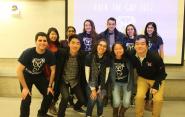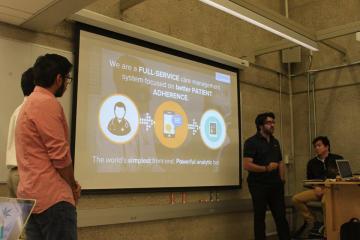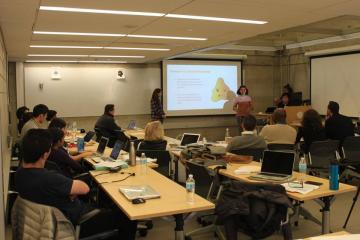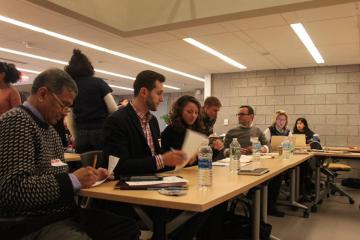Innovators "hack the gap" at the CEID

A hackathon held over the weekend at the Center for Engineering Innovation and Design (CEID) produced a number of innovative solutions to health disparities.

Hack the Gap, a two-day event presented by InnovateHealth Yale and BulldogHacks, was designed to address the health disparities created by systematic or social challenges that disproportionately affect groups based on their race, ethnicity, religion, SES status, gender, or other characteristics historically linked to discrimination or exclusion. In less than 24 hours, Hack the Gap participants pitched pain points, formed teams, and gave presentations.
Dr. Brita Roy, assistant professor of medicine and the director of population health for Yale Medicine, gave the keynote address for the event. Throughout the weekend, six health care professionals served as mentors for the teams.
Eric Chen and Sarah Ornellas, co-lead organizers for Bulldog Hacks, noted that each team was able to iterate and develop a thorough product design. “With great mentorship and hard work, some teams were even able to build functional web-apps that allowed clinicians to track and interact with patient data,” Chen said. “We were particularly impressed by the enthusiasm and creativity with which the participants addressed issues like drug addiction.
The Hack the Gap winners:
$250 Ximedica Prize: For the best designed prototype: Simpliance is a three-member team composed of two Yale graduate students—Arsalan Ahmed and Farhan Murshed—and one Yale College student Suryabrata Dutta. The team addressed the problem of hypertension management by creating a reliable, cheap way to provide full-service care management. They created Simpliance, which is a full-service care management system focused on increased patient adherence, especially among underserved communities. This text-message based service leverages the fact that 87% of the underserved patient population have basic phones, and the text-messaging adherence rate is 78%. Simpliance regularly contacts the user via text to collect essential time-series data for use during clinical checkups. The team also developed a concrete business plan for development.

$150 Innovate Health Yale Prize: Nomster is a two-member team composed of Yale College students Madeleine Lee and Nardos Kebede. They tackled the public health issue of obesity, noting that 7 to 10 people in New Haven are overweight or obese (CARE/YSPH). Their idea is to create an interactive app (virtual food diary) that promotes healthy eating/diet as defined by USDA Food and Nutrition Services. The simple application presents many unique features designed to increase accountability and enable ease of diet tracking. Nomster combines a variety of unique features including gamification, nutritional education, virtual food diaries, and social support. They also plan to include data collected through this application to shape future health policy and research.
Bridge for Billions Incubation Program Prize: Amity Connect is a one-member team featuring Yale College undergraduate Barkley Dai. He addressed the problem of disparities in mental health care by creating a mobile application to diagnose and educate individuals through an interactive game. This application could be licensed by schools and provide a low-cost interactive platform for students and mentors to engage on crucial mental health issues. This tool could be useful in the early diagnosis and reporting of mental health issues, allowing for effective, early intervention.

